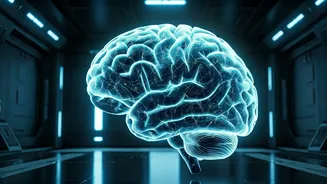Memory's Mysterious Labyrinth
The intricate nature of human memory has long captivated researchers. Memories, especially those from childhood, are often elusive, fading over time or becoming
inaccessible due to various factors. These lost memories are a treasure trove of personal history, containing details and emotions that shape who we are. Scientists recognize the importance of these early experiences in understanding the development of the human mind and personality. The pursuit of memory retrieval isn't merely about reliving the past; it's about gaining a more complete understanding of oneself, including how the mind processes, stores, and recalls experiences. This ambitious endeavor involves an exploration of the brain's complex neural pathways, chemical processes, and the environmental factors that influence memory formation and recall. Moreover, the study of memory loss, like in cases of amnesia, has provided valuable insights, further motivating researchers to find potential treatments and strategies for memory enhancement.
The Time Travel Trick
Scientists have been utilizing innovative techniques that are, metaphorically, like 'time travel' for the mind. These novel approaches focus on stimulating or reactivating dormant neural pathways in the brain. For instance, the use of transcranial magnetic stimulation (TMS), a non-invasive procedure, is being studied for its potential to boost specific brain regions associated with memory. Another method involves the use of virtual reality (VR), creating immersive environments that mimic past scenarios or triggers, which may assist in sparking forgotten memories. Furthermore, researchers are examining the role of specific brain chemicals and neurotransmitters, like acetylcholine and dopamine, in memory formation and retrieval. Understanding how these chemicals work is crucial for developing potential therapies that can improve or restore memory. By employing these techniques, scientists hope to gently coax the brain into revisiting past experiences. This approach is in stark contrast to more invasive methods, favoring a gentle and careful approach to understand and unlock the hidden recesses of the mind.
Unveiling Neural Pathways
A core aspect of this scientific 'time travel' involves mapping and understanding the brain's complex neural networks. Researchers are using advanced neuroimaging techniques, such as functional magnetic resonance imaging (fMRI), to visualize brain activity. These tools allow them to pinpoint which regions of the brain are activated during memory recall. They analyze how different areas of the brain work together to encode, store, and retrieve memories. A significant focus is on understanding the hippocampus, the brain’s primary memory center. Scientists want to understand the hippocampus’ role in forming new memories and its role in replaying older ones. The goal is to build a detailed roadmap of the neural pathways that underpin memory. This detailed understanding will allow researchers to accurately target and stimulate the specific brain regions connected to specific memories. This precise approach promises more effective and personalized memory retrieval methods, moving us closer to reliably accessing our forgotten pasts.
Ethical Considerations Matter
As scientific advancements continue to uncover the mysteries of memory, the ethical dimensions of such research become increasingly significant. Scientists and ethicists are engaging in discussions regarding the boundaries and possible risks. The central question is about the potential implications of accessing and potentially altering someone's memories. Safeguarding the psychological well-being of participants is paramount, emphasizing the need for comprehensive support and guidance throughout research and treatment. The study also raises issues regarding consent, especially when dealing with memories that might be traumatic or emotionally charged. Transparency in research is essential, ensuring that individuals understand the processes involved and potential outcomes. Researchers are committed to acting responsibly, adhering to ethical standards, and taking precautions to prevent any psychological harm while exploring the realm of memory retrieval. These ethical considerations are crucial for maintaining public trust and ensuring that scientific progress benefits everyone safely.
Future Directions & Hopes
The field of memory research is evolving rapidly, with researchers consistently seeking to refine existing techniques and explore novel approaches. Future directions include developing increasingly sophisticated stimulation methods, improving the precision of neuroimaging techniques, and conducting more extensive clinical trials to assess the effectiveness of memory retrieval interventions. Scientists are optimistic about the prospect of applying these advances to help individuals with memory-related disorders, such as Alzheimer's disease and dementia. By understanding the intricacies of memory and the factors that influence its formation and retrieval, researchers aim to develop treatments that can improve cognitive function, and enhance quality of life. The ultimate goal is to offer people the ability to access and experience their memories, allowing a deeper understanding of their past, thus paving the way for a more enriching present and future.














